Sochi 2014 Winter Olympics making 'strong progress'
- Published
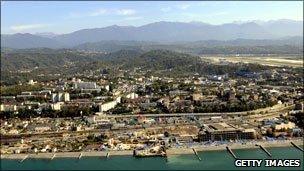
Sochi is looking to provide the most compact Olympic Games event yet
For someone with the pressures and responsibilities of delivering a Winter Olympics to his home city of Sochi in three years' time, Dmitry Chernyshenko cuts a relaxed figure.
Sitting in his London hotel room he runs through the facts and figures associated with hosting the 2014 games, and insists that the majority of projects are running to schedule.
When we spoke last year he had a long "to do" list and some of the items on it are now more advanced than others, such is the challenge of building a complete Olympic infrastructure almost from scratch.
And not even the recent revelation that Sochi 2014 has lost out on two potential major sponsors, diamond firm Alrosa and gas giant Gazprom, can shake his enthusiasm about how things are progressing.
The two companies decided to back the 2018 World Cup football tournament, being held in Russia, and the Russian Olympic team, respectively, rather than the Sochi games.
'Sponsorship goals'
"It is good for the market that a competitive environment for sponsors is growing, and a sign of the attraction around Russian sport now," says Mr Chernyshenko, also pointing out that a F1 race is coming to the country in 2014 too.
He also highlights the fact that the games in the Black Sea port have already attracted more than $1.1bn (£675m) in sponsorship monies, a Winter Games record.
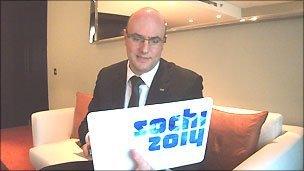
Mr Chernyshenko is confident of securing more sponsor partners
"We are confident that there are enough potential partners in the market to help us reach our [sponsorship] goals," he adds.
"We are well on track to raise the money to stage the games, which as you know are not being run with public funds."
And he still expects to raise about another $200m in commercial deals.
"Some are in the pipeline already," he said, referring to possible partnerships with the metallurgy, chemical and beer industries.
'Symbol of regeneration'
Another source of income for the Sochi organisers comes through the three mascots chosen for the event.

Sochi 2014 executives are hoping to raise money form licensing deals around the games' mascots
Mr Chernyshenko hopes to raise up to $50m in licensing revenues, with the "main driver" being the sales of the games' mascots, approved last month in a public vote.
The mascots, which should go on sale from 1 September, are the snow leopard, polar bear and hare.
The reintroduction of the snow leopard in the wild is a project particularly close to Prime Minister Vladimir Putin's heart. The bear is seen as the grandson of Misha - the symbol of the 1980 Moscow Olympics. And it is hoped the hare will appeal to a female audience.
"The snow leopard is a symbol of Russia's regeneration," says Mr Chernyshenko, showing off the three mascot designs on his laptop screen.
Test programme
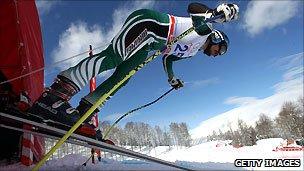
Sochi has already staged one major test skiing event this year
In February at Rosa Khutor, near the village of Krasnaya Polyana outside Sochi, the FIS European Cup in alpine skiing took place - the first of 74 test events on the Sochi facilities before the Winter Olympics begin on 7 February 2014.
"It went well, and we are all ready to host the skiing world cup next year," says Mr Chernyshenko, a keen downhill skier.
"We have a comprehensive programme of other test events in place to ensure everything runs smoothly in 2014."
Road and rail route
Another centrepiece of the games, which Mr Chernyshenko is proud of, is the infrastructure work that will provide not only new stadiums, but also roads, bridges, railways, and other fixtures for the benefit of the city and region.
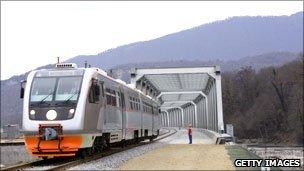
The new road and rail system will carry 20,000 passengers an hour
It means the construction of 300km (186 miles) of roads, 100km of rail, 39 tunnels and 24 thermal and hydro-power stations.
"The region around Sochi will benefit from the infrastructure, such as new roads and technology, which is put in place for the games," he says.
One of the main infrastructure projects for the games is the combined road and rail route linking the Sochi District city of Adler to the Alpika-Service mountain resort.
The route is 48.2km long will be not only the main passenger artery of 2014 Olympic Games, but will also improve the regional traffic infrastructure.
"The motorway and tunnel work is coming along well, and the road should be ready by mid-2013," he says. "We are leaving a great transport legacy."
The combined capacity of this road and rail project should ensure the delivery of 20,000 passengers per hour.
Landscaping
Meanwhile, the games arenas are being built in the most geographically compact zone of any previous games, which it is hoped will create more interest in the various events.
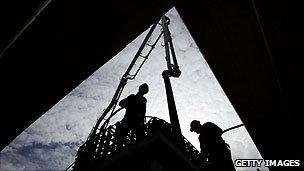
The majority of Sochi games construction work should be completed by the end of 2011
"All the venues are nearby to each other, it is only a half hour from one sporting cluster to another cluster," says Mr Chernyshenko.
There still remains some land to be developed, and even purchased in some cases, on the periphery of the event zones, the Moscow State Technological University graduate adds.
"It is mainly on the landscaping surrounding the main building work, there are some old buildings, houses or units that still need to be relocated," he says.
"There are discussions between the state to buy and the owners to sell."
And he predicts that by the end of 2011 some 70% of construction work will be completed.
"At the same time we are setting new green standards for construction in our country," he adds.
'Volunteer movement'
The Sochi team has also been building links with the London 2012 games team.
Next year they will have an ice rink in Marble Arch - dubbed Sochi World - with famous Russian figure skaters and Olympic champions on show to the public.
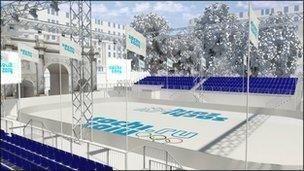
The Sochi organisers will set up an ice rink in the centre of London in 2012
"We will also bring famous Russian artist and stars to participate in the London 2012 cultural Olympiad," says Mr Chernyshenko, who began his career in advertising.
Meanwhile, closer in time, Sochi will herald its 1,000-day countdown to the Olympics on 14 May with the launch of its volunteer programme.
This is something Mr Chernyshenko is particularly proud of, in a country without a strong volunteering heritage.
"We are in fact creating the volunteer movement in our country," he says.
An estimated 25,000 volunteers will work during the games in more than 20 areas, including meeting and greeting the delegations at the airport and helping to organise the closing ceremony.
And the best 3,000 volunteers, trained to help visitors attending the games to travel between the city's venues and ensure that they are given a welcoming and friendly reception, will he says, "show the world the face of the new modern Russia".